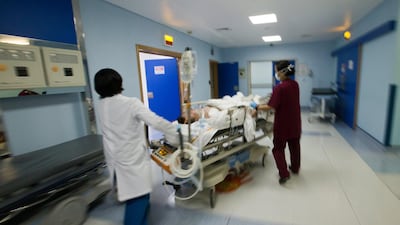Public and private hospitals must treat emergency patients regardless of their health insurance cover, the Abu Dhabi government said.
Medical chiefs were told they cannot ask for payment up front or delay treatment for financial reasons.
The circular was sent to "all health service providers in Abu Dhabi emirate, reiterating the importance of receiving/treating all emergency cases - regardless of validity of the insurance cards - and to ensure that hospitals are prepared to accept or refer necessary cases," Abu Dhabi Government Media Office said on Wednesday.
The warning came days after a father accused two Al Ain hospitals of negligence in connection with the death of his son, though the statement made no mention of the case or any other.
Abu Dhabi hospitals are already obliged to treat patients regardless of their medical cover, following an order from the health authorities several years ago.
Omran Al Khoori, president of the health provider VPS, which runs Burjeel hospitals, said the government appeared to be ensuring all hospitals are still “on the right track”.
"We completely agree that emergency cases must be received and dealt with immediately, regardless of insurance or finances," he told The National.
When asked if that would cause a complication to hospitals, having to accept many cases without financial coverage, he said: “We have always taken the lead at VPS in promoting a humanitarian approach, and we don’t look at issues from a financial angle.”
As The National reported this week, Alaa Rawajbi's two-year-old son Kareem died from sepsis in October.
The Jordanian engineer took his son to a private hospital where his insurance was valid, but deteriorated and Kareem was referred to a second private facility.
But he arrived to find his insurance was not valid and that hospital chiefs demanded Dh10,000 in cash.

"I told them 'I have Dh2,000 on me now, start treating the boy until I fetch the rest of the amount'," he told The National last week.
The hospital refused, he said, and he eventually took Kareem to a government hospital, which treated him.
Kareem died on October 13, five days after first falling ill with flu-like symptoms.
Mr Rawajbi reported both hospitals to the medical regulator and filed a legal case against one in Al Ain court. Neither were publicly named. The incident is still under investigation.
A complex health insurance system
Medical insurance regulations vary significantly between the emirates.
Abu Dhabi is regarded as having the most comprehensive cover for the average resident, introducing mandatory health cover in 2006. It is provided by employers and their employees' families are typically covered. It entitles someone to Dh250,000 of care.
Dubai's mandatory health insurance - introduced in 2015 - stipulates employees, their dependents and any domestic helpers are entitled to Dh150,000 per year of treatment.
The Northern Emirates are yet to bring in mandatory cover meaning many residents must pay for their own costly treatment if their employer does not opt to provide insurance.
Medical insurance packages can also vary significantly in terms of the cover provided.

